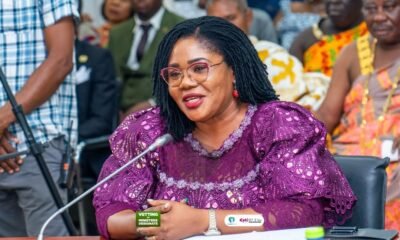Bussiness
Economic Crisis: Reduce the size of Gov’t to complement debt program – ISSER

The Institute of Statistical, Social and Economic Research (ISSER) of the University of Ghana has called for a reduction in the size of government amid Ghana’s economic turmoil.
Addressing a 2023 budget review forum at the institute Tuesday, the Director of ISSER, Professor Peter Quartey, said to restore macroeconomic stability and build a resilient economy there was the need for fiscal consolidation — raising revenue and reducing expenditure, including reducing the size of government.
According to him, the increase in the VAT and cost-cutting measures in the public sector should be complemented by a reduction in the size of the government to achieve the desired outcome.
On the debt programme, Prof. Quartey said that a national consensus among key stakeholders, such as Parliament, investors, civil society organisations (CSOs) and the citizenry, would help accelerate the country’s recovery efforts and avoid the mistakes that led the economy into its current challenges.
“The government should deepen consultations, while the opposition engage meaningfully to avoid the mistakes of the past,” Prof. Quartey said.
Government has launched the Debt Exchange Program announced in the 2023 budget.
This comes on the heels of the conclusion of the broad contours of the debt sustainability analysis as part of the debt restructuring deal with the International Monetary Fund(IMF).
The debt operation is part of a comprehensive set of measures for reducing the present value of public debt to Gross Domestic Product (GDP) ratio to, at least, 55 percent in the medium term by offering an effective cap on interest payments on public debt.
Finance Minister Ken Ofori-Atta on Monday announced domestic bondholders with the exception of Treasury bill holders will be affected by the debt exchange program.
Per the arrangement, bondholders will get 0% interest in 2023, 5% in 2024 and 10% onwards. The bonds will also be redeemed in 3 installments within 10 years.
Source: Starrfm.com.gh
Bussiness
Ghana’s GDP shows economy is fast recovering despite DDEP – Finance Ministry

Ghana’s Gross Domestic Product (GDP) indicates a rapid economic recovery despite global challenges and ongoing debt restructuring, according to the Ministry of Finance (MoF).
The Ministry in a statement today indicated that latest data from the Ghana Statistical Service (GSS), cumulative economic growth for the second quarter (Q2) of 2024 reached 6.9%, a notable increase from the 4.7% recorded in the first quarter of 2024.
The MoF statement further noted that, “The economy’s robust recovery is in response to the macroeconomic stability and growth interventions that government is pursuing under our IMF-supported Post Covid-19 Programme for Economic Growth (PC-PEG).”
According to them, the overall real GDP growth for the first half of 2024 rebounded strongly, with year-on-year GDP growth averaging 5.8% for the period, significantly higher than the 2.9% recorded in the same period in 2023.
By Edem Mensah-Tsotorme
Read full statement below


Bussiness
Facebook, Youtube, online trading companies must be taxed – Deputy Finance Minister

The Deputy Finance Minister Dr Alex Ampaabeng, has proposed that online trading companies should be taxed to bolster the economy.
He noted that these companies, both local and international, generate significant revenue from their Ghanaian clients, which underscores the necessity for taxation.
In an interview with Bernard Avle on Channel One TV’s The Point of View, Dr Ampaabeng pointed out various potential revenue sources for Ghana, including online businesses and content creation companies.
He questioned why other national companies operating in Ghana are taxed, but social media platforms like Youtube and Facebook, which run numerous advertisements, are not included in the Ghanaian tax system.
According to him, these social media companies earn profits from the advertisements they display, and online trading companies also generate income from the sale of their products and services.
He mentioned online trading companies such as Jiji, Jumia, and Tonaton, which he believes surpass all physical marketplaces in Ghana in size.
According to him, “I can’t think of a country which has not gotten a digital service tax system of some sort, so Ghana is long overdue. Just to make an example so that people will appreciate where I’m coming from. Go to Youtube and play a video, within one or two minutes, you are going to watch about two, or three adverts.”
“What it tells you is that Facebook or Youtube is making profits right here in Ghana. Go to your Facebook account, and you are going to see a number of adverts on your right, left. What it is telling you is that Facebook is making profits right here in Ghana and not being taxed. Meanwhile, there are companies operating in Ghana, for jurisdiction reasons, of course, that are being taxed,” he said.
The Deputy Minister added that “So then, it comes to the question of the application of our tax laws. Revenues generated in Ghana are subject to taxes. We have Facebook, TikTok and all those players, these are digital platform owners.”
He stressed, “Then we have the digital or market players, here we are talking about individuals who are using the digital platforms. We have Jiji, Jumia, Tonaton, these combined, are bigger than all physical marketplaces in Ghana. And it tells you the volume of transactions, that are going on there.”
He expressed his hope that individuals earning online profits from Ghanaian residents would be taxed.
“There are conversations ongoing, I wouldn’t want to pre-empt anything, maybe in the future, it might not be anytime soon, what I would like to see, is a Ghana where people who are earning all forms of profits in the country are subject to taxes. People who are trading online to Ghanaian residents, people who are generating revenue from Ghana are allowed to pay taxes,” he noted.
Additionally, he proposed a collaboration with the government to curb cybercrime by registering and verifying these online trading companies.
“We can have a system where the government engages these operators, so individuals will submit their Ghana Card and are registered and verified,”he concluded.
Source: Citinewsroom.com







